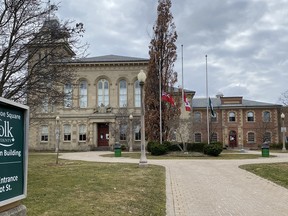
Norfolk homeowners will have an average of $216 added to their 2024 county tax bills.
Advertisement 2
Article content
After two days of deliberations, county councilors made a few changes to the levy-supported operating budget but the result had little impact on the original numbers.
Article content
At the start of budget talks on Wednesday, the proposed budget was $128.3 million. On Thursday, council approved a final budget of $128.5 million, moving the median tax increase from 6.2 per cent to 6.3 per cent over 2023.
Taxes for a median residential property (assessed at $240,000) will be $3,831.
“There has been lots of discussion and debate over the last two days, moving the needle both up and down,” Mayor Amy Martin said at the end of Thursday’s meeting. “Thank you staff for your efforts on building a pretty lean budget. There wasn’t much for us to take out and claw back but we were also able to have a good discussion about some of our community and ward-based priorities.”
Advertisement 3
Article content
The municipality’s operating budget covers day-to-day spending on services such as recreation programs, park maintenance, public health, city roads, garbage collection, delivery of safe drinking water and emergency services.
It also includes the salaries and benefits of the county’s 855 employees, which is just over $88 million for 2024, up $3.1 million from 2023.
About $5 million is being invested in what Norfolk CAO Al Meneses described as “aging and insufficient” infrastructure, along with a contribution to the municipality’s depleted reserves.
Heidi VanDyk, general manager of corporate services, said expected spending from levy-funded capital reserves over the next five years will continue to exceed contributions for a total of nearly $15 million. She said staff will continue to recommend increased reserve contributions in future years.
Advertisement 4
Article content
At the start of Thursday’s meeting Coun. Chris VanPaassen said in addition to bolstering depleted reserves, the municipality faces replacing its aging assets and upgrading water and sewer services.
“So, pretty soon our largest expense will no longer be the roads department,” said Van Paassen. “It will be the debt-servicing department. I hope nobody gets distracted to think we should reduce the amount going into reserves to artificially lower a tax increase.”
At a meeting last October, council approved a 10-year capital plan, covering 2024 to 2033, that includes infrastructure investments related to water ($235 million), wastewater ($177 million), roads and bridges ($298 million) and facility needs ($93 million). About $148 million worth of projects had to be re-budgeted from previous years due to lack of funding.
Advertisement 5
Article content
Chris Everets, manager of financial planning reporting, described the operating budget as “business as usual,” with few notable investments.
In addition to the need to address reserves, Everets said employee contract increases and rising prices of goods and services drove substantial impacts to the budget. Utility costs for the county are up $408,000 and development charges exemptions are up $350,000.
On the more side, the county realized about 1.6 million in savings for insurance, winter control, blue box transition and investment income.
Changes to the budget approved by council on Thursday include:
- $55,000 for a new full-time position to assist the mayor’s office and councillors.
- $51,600 for a part-time library assistant position.
- $90,000 for a full-time economic development department position.
- $150,000 to address economic development priorities.
- $70,000 removed from the operating budget for one-time economic development priorities to be funded instead from council initiative reserves.
- $21,500 removed from the operating budget to purchase counter-top organics recyclers as a pilot project. The money will instead come from council initiative reserves.
- $34,000 removed from the operating budget for the grant program.
Article content